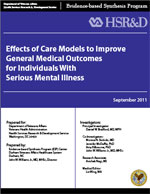
|
Principal Investigator: Daniel W. Bradford, MD, MPH; Co-Investigators: Monica N. Slubicki, MD; Jennifer McDuffie, PhD; Amy Kilbourne, PhD; John W. Williams Jr., MD, MHSc Evidence-based Synthesis Program (ESP) Center
Durham VA Medical Center Washington (DC): Department of Veterans Affairs; September 2011 |
Download PDF: Complete Report, Executive Summary, Report, Appendices
Individuals with serious mental illness (SMI) have shortened life expectancies relative to the general population to an extent that is not explained by unnatural causes such as suicide or accidents. Numerous studies show higher rates of acute and chronic illnesses, lower quality general medical care and worse outcomes in individuals with SMI. The issues that influence general medical outcomes for individuals with SMI are complex and overlapping and likely vary by disease state. Relevant factors can be categorized to include population characteristics, contextual and system factors, provider factors, and community resources. Interventions aimed at improving general medical outcomes in this population could be directed at any one, or several, of these factors. The organization of service delivery for individuals with SMI may be the most modifiable of the many factors that impact general medical outcomes in this population. In this review, we sought to evaluate models of care designed to improve general medical outcomes among individuals with SMI. We conducted a systematic review of the peer-reviewed literature to answer the following key questions (KQs):
Key Question #1: What types of care models have been evaluated prospectively that integrate mental health care and primary medical care with the goal of improving general medical outcomes for individuals with serious mental illness (SMI)?
Key Question #2: Do models of integrated care for individuals with SMI improve the process of care for preventive services (e.g., colorectal cancer screening) and chronic disease management (e.g., annual eye examination in patients with diabetes mellitus [DM])?
Key Question #3: (3a) Do models of integrated care for individuals with SMI improve general functional status outcomes (e.g., as measured by SF-36) or disease-specific functional status outcomes (e.g., Seattle Angina Questionnaire) related to medical care for chronic medical conditions such as DM, hypertension, or heart failure? (3b) Do models of integrated care for individuals with SMI improve clinical outcomes related to preventive services (e.g., influenza rates) and chronic medical care (e.g., kidney disease, amputations, retinopathy in patients with coexisting DM)?
Key Question #4: What are the gaps in evidence for determining how best to integrate care to improve
general medical outcomes for individuals with SMI?